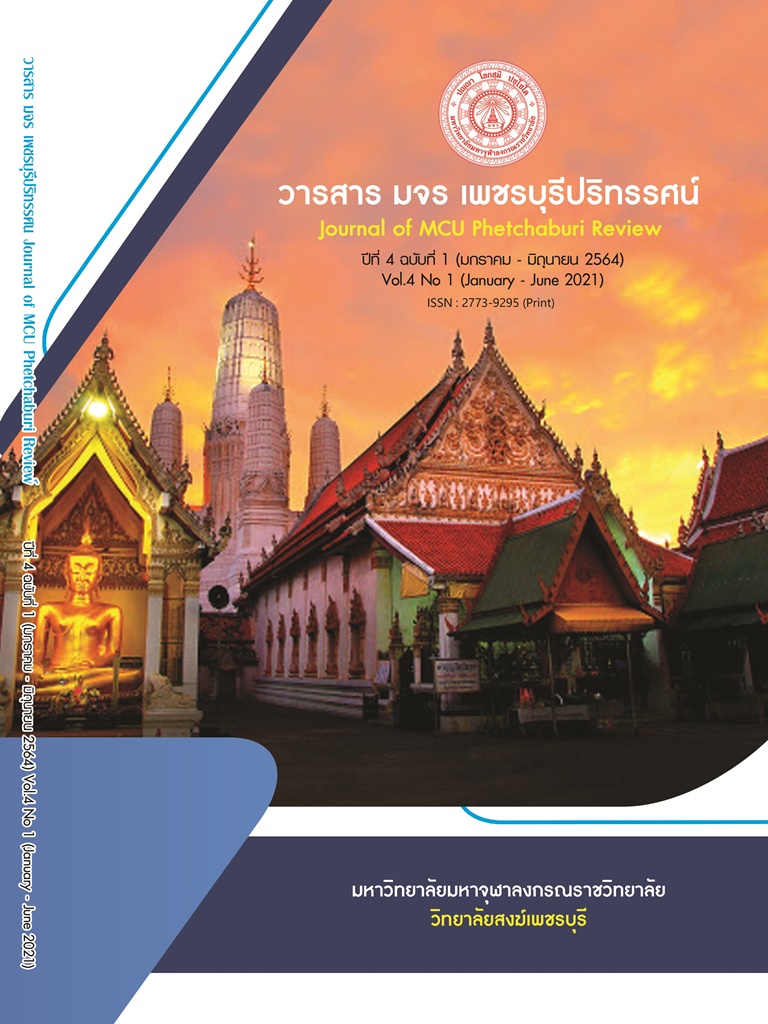NON-TRADITIONAL THREATS IN PHETCHABURI
Main Article Content
Abstract
The objectives of this article were to analyze the impact of new threats in Phetchaburi Province. Prevention guidelines and troubleshooting using integrated research methods from the study of documents, thesis, research reports, textbooks, academic documents, journals and related sources. There were 26 key informants/person, a group discussion of 10 people, and a questionnaire of 206 sets. The results showed that 1) the threat to politics and governance was conflict of interest. between conservation groups and development groups but can negotiate at the local level by providing opportunities for villagers in each locality to participate; 2) economic threats such as poverty, that is, farmers are exploited by various means; from middlemen and capitalists Should be solved by government projects, such as projects to solve the problem of informal debt. food solution project Sustainable Thai Niyom Project infrastructure Water and Transportation Management System by transforming the policy into more effective practice. 3) Social and cultural threats such as drugs (traders/distributors), information technology. (Mobile phones/modern communication devices) 4) Threats to natural resources and the environment such as forest burning, urban waste problems. and public invasion Because it is a pollutant and destroys the harsh environment. The solution is to build a strong community. Management according to the principles of good governance and effective law enforcement; and 5) epidemic threats, including emerging and re-emerging problems, especially the spread of the COVID-19 virus Which enters the third wave of Thailand, which tends to have an increasing number of addicts. The vaccine has yet to be truly reassuring.
Article Details

This work is licensed under a Creative Commons Attribution-NonCommercial-NoDerivatives 4.0 International License.
References
กฤษฎา บุญชัย. (25636). การประเมินความเสียหาย ผลกระทบและการปรับตัวของชุมชนท้องถิ่นต่อภาวะโรคระบาด COVID 19. กรุงเทพมหานคร: สถาบันชุมชนท้องถิ่นพัฒนา.
กิตติ ประเสริฐสุข และคณะ. (2562). ไทยกับความมั่นคงรูปแบบใหม่ : การค้ามนุษย์ การย้ายถิ่นแบบไม่ปกติ อาชญากรรมข้ามชาติ และความมั่นคงปลอดภัยไซเบอร์. ใน (วิทยานิพนธ์รัฐศาสตร์มหาบัณฑิต สาขาการเมือง). บัณฑิตวิทยาลัย มหาวิทยาลัยมหาสารคาม.
คณะรัฐมนตรี. (2546). นโยบายและแผนระดับชาติว่าด้วยความมั่นคงแห่งชาติ (พ.ศ. 2560- 2564). กรุงเทพมหานคร: สำนักงานสภาความมั่นคงแห่งชาติ สำนักนายกรัฐมนตรี.
บุญชม ศรีสะอาด. (2561). การวิจัยเบื้องต้น. กรุงเทพมหานคร: สุวีริยาสาส์น.
ผู้ให้ข้อมูล 1. (22 พฤษภาคม 2563). ภัยคุกคามรูปแบบใหม่ในจังหวัดเพชรบุรี. (อนุชา พละกุล, ผู้สัมภาษณ์)
ผู้ให้ข้อมูล 2. (25 พฤษภาคม 2563). ภัยคุกคามรูปแบบใหม่ในจังหวัดเพชรบุรี. (อนุชา พละกุล, ผู้สัมภาษณ์)
ผู้ให้ข้อมูล 3. (18 มิถุนายน 2563). ภัยคุกคามรูปแบบใหม่ในจังหวัดเพชรบุรี. (อนุชา พละกุล, ผู้สัมภาษณ์)
ผู้ให้ข้อมูล 4. (25 มิถุนายน 2563). ภัยคุกคามรูปแบบใหม่ในจังหวัดเพชรบุรี. (อนุชา พละกุล, ผู้สัมภาษณ์)
ผู้ให้ข้อมูล 5. (29 มิถุนายน 2563). ภัยคุกคามรูปแบบใหม่ในจังหวัดเพชรบุรี. (อนุชา พละกุล, ผู้สัมภาษณ์)
ผู้ให้ข้อมูล 6. (29 มิถุนายน 2563). ภัยคุกคามรูปแบบใหม่ในจังหวัดเพชรบุรี. (อนุชา พละกุล, ผู้สัมภาษณ์)
ผู้ให้ข้อมูล 7. (10 กรกฎาคม 2563). ภัยคุกคามรูปแบบใหม่ในจังหวัดเพชรบุรี. (อนุชา พละกุล, ผู้สัมภาษณ์)
ผู้ให้ข้อมูล 8. (15 กรกฎาคม 2563). ภัยคุกคามรูปแบบใหม่ในจังหวัดเพชรบุรี. (อนุชา พละกุล, ผู้สัมภาษณ์)
ผู้ให้ข้อมูล 9. (20 กรกฎาคม 2563). ภัยคุกคามรูปแบบใหม่ในจังหวัดเพชรบุรี. (อนุชา พละกุล, ผู้สัมภาษณ์)
ภาราดา ชัยนิคม. (2558). ความรู้และการเตรียมความพร้อมต่อภัยคุกคามรูปแบบใหม่: กรณีศึกษา โรงเรียนมัธยมศึกษาในอำเภอเมืองจังหวัดเพชรบูรณ์. ใน (รายงานการวิจัย). มหาวิทยาลัยราชภัฏเพชรบูรณ์.
พระราชบัญญัติสภาความมั่นคงแห่งชาติ พ.ศ. 2559. (2559). ราชกิจจานุเบกษาเล่ม 133 ตอนที่ 85 ก. (26 กันยายน 2559).
สุดาวรรณ ประชุมแดง และคณะ. (2558). การขัดกันของผลประโยชน์ของกลุ่มธุรกิจการเมืองไทย. วารสารสังคมศาสตร์และมานุษยวิทยาเชิงพุทธ. 5(6), 102-117


